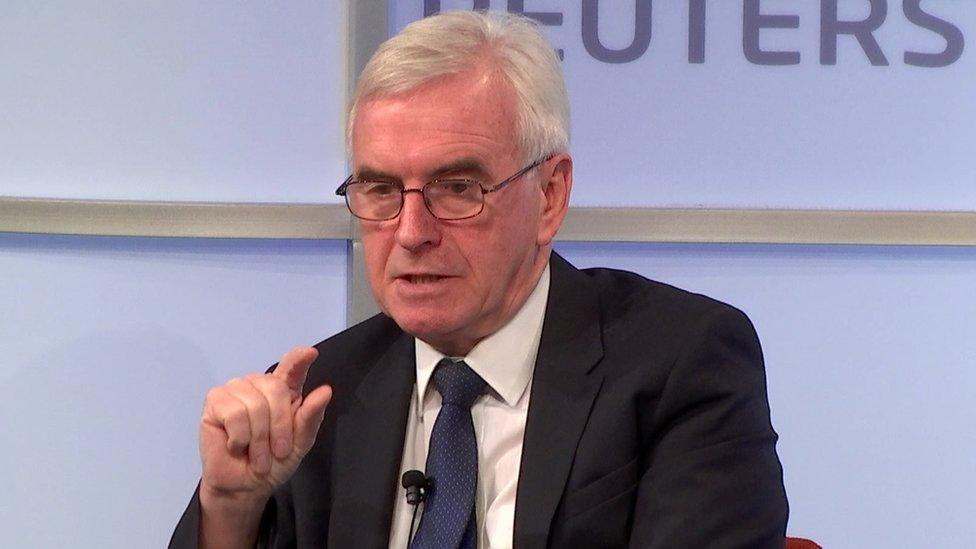Labour could form minority government without election - McDonnell
- Published
- comments

Labour could form the next government without a general election if MPs don't back Theresa May's Brexit deal, John McDonnell has suggested.
The shadow chancellor said Labour should be offered the chance to form a minority administration if Mrs May keeps losing Commons votes.
The party would then seek to get majority for its version of Brexit.
Failing that, he said, there should be a general election and the final option would be another EU referendum.
Theresa May is heading to Brussels for talks with EU leaders and is hoping they will finalise the Brexit withdrawal agreement on Sunday. MPs will then get a vote on the deal.
As things stand, it appears there is no majority for Mrs May's deal in the Commons - but ministers hope enough MPs will swing behind it to get it through because the only alternative is no deal or "no Brexit".
Labour and the other opposition parties are trying to find a way to present MPs with other options.
Mr McDonnell said there could be a series of votes and it was "very difficult to predict" what the final outcome would be - but, echoing Conservative cabinet minister Amber Rudd, he said he did not think there was a majority for a no-deal Brexit.
Speaking at Reuters event in London, he said it was "difficult to see" how there could be a general election - which Labour leader Jeremy Corbyn has long insisted is his preferred option - at the moment because it would require two-thirds of MPs to back it under the Fixed Term Parliament Act.
He said: "My own view is we haven't explored sufficiently, neither has the media, these concepts, the constitution, our custom and practice,
"If it's a minority government and they can't obtain a majority in parliament, usually it's then the right, the duty of the Monarch to offer to the Opposition the opportunity to form a government and that would be a minority government, and see if they can secure a majority in parliament.
"I think we can secure a majority in parliament for some of the proposals we're putting forward."
Nicola Sturgeon on working with Labour to fight Brexit deal
He said opposition parties were normally asked to form a government when a minority government was losing votes in the House of Commons.
This was already happening as the Democratic Unionist Party withdrew its support for Mrs May in Budget votes in protest at her EU withdrawal agreement, he said.
"However, I think the test is whether the government is losing consistent votes on the issue of the deal itself," he argued.
In that case, he argued, Labour should be given a chance to try and get a majority for its plans.
"Failing that I think a general election is the route we need, and obviously, if we can't secure that then a further referendum."
'Part of the discussion'
At the moment Labour was working an amendments to the meaningful vote, that will give MPs an "opportunity to avoid no deal at all costs - and I think there is a vast majority of MPs that would support that".
He said he hoped "to demonstrate over the next couple of weeks that there is a consensus in Parliament for a new approach".
The shadow chancellor was sceptical about the chances of Brexit being stopped by another referendum, as some of his party's own MPs in the People's Vote campaign are hoping.
"My fear is that if we did have another referendum, we might get the same or similar result and the country will still be divided. Somehow we have got to try and bring the country back together again."
If there was another referendum, putting the option of staying in the EU on the ballot paper should be "part of the discussion", he told the event.
He said Labour would seek to negotiate a permanent customs union with the EU after Brexit, which he said would remove the need for a Northern Ireland "backstop" that has caused so much controversy.